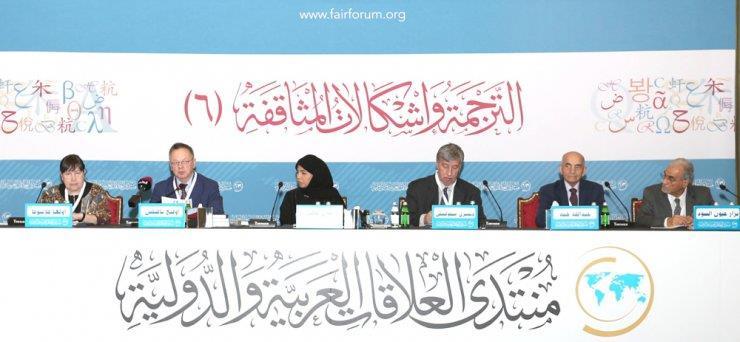
Academics from over 130 countries participate in 6th International Translation Conference
(MENAFN- The Peninsula) With the participation of a group of translators and academics from over 130 different countries, the Sixth International Translation Conference, organised by the Forum for Arab and International Relations, started yesterday.
The two-day conference is a cultural and intellectual forum for Arab and non-Arab translators, as their research and scientific experiences vary in different languages and cultures. The conference will review more than 40 papers related to translation issues in eight sessions.
In his opening speech at the conference, Dr. Muhammad Hamed Al Ahmari, Director of the Forum for Arab and International Relations, praised the role of translators in transferring cultures and knowledge between nations, stressing that they provide with great service to all of humanity.
Al Ahmari noted that there are some translations that are done in a hurry and that the scientific standards have not been observed a matter which affects the understanding of the culture of the source language.
The conference has become an annual event parallel to the Sheikh Hamad Award for Translation and International Understanding, said Al Ahmari noting that the conference has achieved good results and its works have been well received by those interested in the field of translation, dialogue and culture exchange.
He appreciated the efforts of the organizing committee and the efforts of the scientific committees for the proposed research, as well as the efforts of the committee of Sheikh Hamad Award for Translation and International Understanding.
The first session of the conference came under the title ‘Problems of translation from/to Arabic to Russian', where a number of aspects were reviewed, including Russian-Arab cultural relations, a brief history of the translator by a former diplomat Oleg Pavikin.
While Russian researcher, Dmitry Mikulski, from the Orientalist Institute of the Russian Academy of Sciences discussed in his paper the database of news and topics addressed in the history books of Arab Islamic kings in the ninth and tenth centuries AD.
As Russian translator Olfa Vlasova addressed the characteristics of translation of Moroccan works of writers from Arabic into Russian. 'Problems of translation into Russian was also discussed in a paper presented by the Iraqi translator Abdullah Bead. There was another paper 'Concerns of the Arabic vs Russian translation by Syrian translator Dr. Nizar Ayoun Al-Aswad discussed the prospects of the translation between these two languages. The second session was devoted to discussing the problems of Arabic translation and some of the selected languages, including Portuguese, Chinese, Uzbek, Malayalam, Somali and Bahasa. During this session, Dr. Zhang Hongy, Dean of the College of Arabic Studies at the University of International Studies in Beijing, presented a paper on the problem of cultures: Arabisation and Westernisation in Arabic-Chinese translation.
Catarina Bello, a researcher and translator and professor at the American University in Cairo, presented a paper entitled ‘Translation from Arabic into Portuguese: the case of Islamic philosophy in the Middle Ages', and the researcher, Dr. Jaber Al-Omari, head of the Department of Arab Research and Studies at BTM College in the Indian state of Kerala, addressed the problems facing translators from Arabic to Malayalam, where he considered that the most important problem facing the translator there is the wealth of vocabulary in Arabic, in contrast to a weakness in the Malayalam language, so the translator is puzzled when he thinks about choosing words.
A Somali translator also presented a paper entitled ‘Translation from Somali to Arabic: problematic terminology and vocabulary', in which he dealt with the history of the Somali language and its relationship to the Arabic language and why Somali was not written in the Arabic alphabets and the influence of Arabic language on Somali language.
While the Indonesian researcher Mashfaq Al Rahman discussed in his paper the problem of translating pre-Islamic poetry into the Indonesian language and its importance in understanding the authenticity of Arab heritage, pointing to the interest of Indonesians in Arabic literature, but modern literature has a greater interest than heritage because of its difficulty in translation and understanding as well.
The 3rd session was devoted to discussing the problems of literary translation. The fourth session also addressed the problems of translation in Islamic literature. The fifth session discussed translation between the accuracy of the term, the smoothness of the text, and the cultural challenge of the target language.

Legal Disclaimer:
MENAFN provides the
information “as is” without warranty of any kind. We do not accept
any responsibility or liability for the accuracy, content, images,
videos, licenses, completeness, legality, or reliability of the information
contained in this article. If you have any complaints or copyright
issues related to this article, kindly contact the provider above.


















Comments
No comment